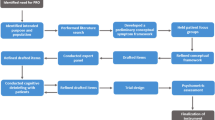Abstract
The aim of this study was to develop the Mayo Dysphagia Questionnaire-30 Day (MDQ-30), a tool to measure esophageal dysphagia, by adapting items from validated instruments for use in clinical trials, and assess its feasibility, reproducibility, and concurrent validity. Outpatients referred to endoscopy for dysphagia or seen in a specialty clinic were recruited. Feasibility testing was done to identify problematic items. Reproducibility was measured by test–retest format. Concurrent validity reflects agreement between information gathered in a structured interview versus the patients’ written responses. The MDQ-30, a 28-item instrument, took 10 min (range = 5–30 min) to complete. Four hundred thirty-one outpatients [210 (49%) men; mean age = 61 years] participated. Overall, most concurrent validity κ values for dysphagia were very good to excellent with a median of 0.78 (min 0.28, max 0.95). The majority of reproducibility κ values for dysphagia were moderate to excellent with a median κ value of 0.66 (min 0.07, max 1.0). Overall, concurrent validity and reproducibility κ values for gastroesophageal reflux disease (GERD) symptoms were 0.81 (95% CI = 0.72, 0.91) and 0.66 (95% CI = 0.55, 0.77), respectively. Individual item percent agreement was generally very good to excellent. Internal consistency was excellent. We conclude that the MDQ-30 is an easy-to-complete tool to evaluate reliably dysphagia symptoms over the last 30 days.
Similar content being viewed by others
References
Locke CRIII, Talley NJ, Nelson DK, Haruma K, Weaver AL, Zinsmeister AR, et al. Helicobacter pylori and dyspepsia: a population-based study of the organism and host. Am J Gastroenterol. 2000;95(8):1906–13.
Wiklund IK, Junghard O, Grace E, Talley NJ, Kamm M, Veldhuyzen van Zanten S, et al. Quality of life in reflux and dyspepsia patients. Psychometric documentation of a new disease-specific questionnaire (QOLRAD). Eur J Surg Acta Chir Suppl 1998;583:41–9.
Svedlund J, Sjodin I, Dotevall G. GSRS—a clinical rating scale for gastrointestinal symptoms in patients with irritable bowel syndrome and peptic ulcer disease. Dig Dis Sci. 1988;33(2):129–34.
Best WR, Becktel JM, Singleton JW, Kern F Jr. Development of a Crohn’s disease activity index. National Cooperative Crohn’s Disease Study. Gastroenterology. 1976;70(3):439–44.
Irvine EJ, Zhou Q, Thompson AK. The Short Inflammatory Bowel Disease Questionnaire: a quality of life instrument for community physicians managing inflammatory bowel disease. CCRPT Investigators Canadian Crohn’s. Relapse Prevention Trial. Am J Gastroenterol. 1996;91(8):1571–8.
Hutchings HA, Upton P, Cheung WY, Maddocks A, Eiser C, Williams JG, et al. Adaptation of the Manchester-Minneapolis quality of life instrument for use in the UK population. Arch Dis Child. 2007;92(10):855–60.
Chen AY, Frankowski R, Bishop-Leone J, Hebert T, Leyk S, Lewin J, et al. The development and validation of a dysphagia-specific quality-of-life questionnaire for patients with head and neck cancer: the M. D. Anderson Dysphagia Inventory. Arch Otolaryngol Head Neck Surg. 2001;127(7):870–6.
McHorney CA, Robbins J, Lomax K, Rosenbek JC, Chignell K, Kramer AE, et al. The SWAL-QOL and SWAL-CARE outcomes tool for oropharyngeal dysphagia in adults: III. Documentation of reliability and validity. Dysphagia. 2002;17(2):97–114.
Grudell AB, Alexander JA, Enders FB, Pacifico R, Fredericksen M, Wise JL, et al. Validation of the Mayo Dysphagia Questionnaire. Dis Esophagus. 2007;20(3):202–5.
Locke GR, Talley NJ, Weaver AL, Zinsmeister AR. A new questionnaire for gastroesophageal reflux disease. Mayo Clin Proc. 1994;69(6):539–47.
Dauer E, Thompson D, Zinsmeister AR, Dierkhising R, Harris A, Zais T, et al. Supraesophageal reflux: validation of a symptom questionnaire. Otolaryngol Head Neck Surg. 2006;134(1):73–80.
Dhillon S, Romero Y, Harmsen W, et al. Concurrent validity and reproducibility characteristics of the Reflux Symptoms Questionnaire and the Reflux Symptoms Questionnaire 1-W. Am J Gastroenterol. 2002;97(Suppl):S243.
Peloquin J, Fredericksen M, Geno D, et al. Mayo Dysphagia Questionnaire—2 week: Validation of a symptom questionnaire. Am J Gastroenterol. 2006;101(9):S418.
Marks RD, Richter JE. Peptic strictures of the esophagus. Am J Gastroenterol. 1993;88(8):1160–73.
Cox JG, Winter RK, Maslin SC, Jones R, Buckton GK, Hoare RC, et al. Balloon or bougie for dilatation of benign oesophageal stricture? An interim report of a randomised controlled trial. Gut. 1988;29(12):1741–7.
Landis JR, Koch GG. The measurement of observer agreement for categorical data. Biometrics. 1977;33(1):159–74.
Eypasch E, Williams JI, Wood-Dauphinee S, Ure BM, Schmülling C, Neugebauer E, et al. Gastrointestinal Quality of Life Index: development, validation and application of a new instrument. Br J Surg. 1995;82(2):216–22.
Acknowledgment
We thank Lori R. Anderson for her help in typing and submitting the manuscript. This work was supported in part by the Miles and Shirley Fiterman Center for Digestive Diseases at the Mayo Clinic, Rochester, MN. Yvonne Romero was supported in part by a grant from the NIH (NIDDK 02956). Jeffrey Alexander was supported in part by Glaxo Smith Kline and Merck.
Author information
Authors and Affiliations
Corresponding author
Rights and permissions
About this article
Cite this article
McElhiney, J., Lohse, M.R., Arora, A.S. et al. The Mayo Dysphagia Questionnaire-30: Documentation of Reliability and Validity of a Tool for Interventional Trials in Adults with Esophageal Disease. Dysphagia 25, 221–230 (2010). https://doi.org/10.1007/s00455-009-9246-8
Received:
Accepted:
Published:
Issue Date:
DOI: https://doi.org/10.1007/s00455-009-9246-8




